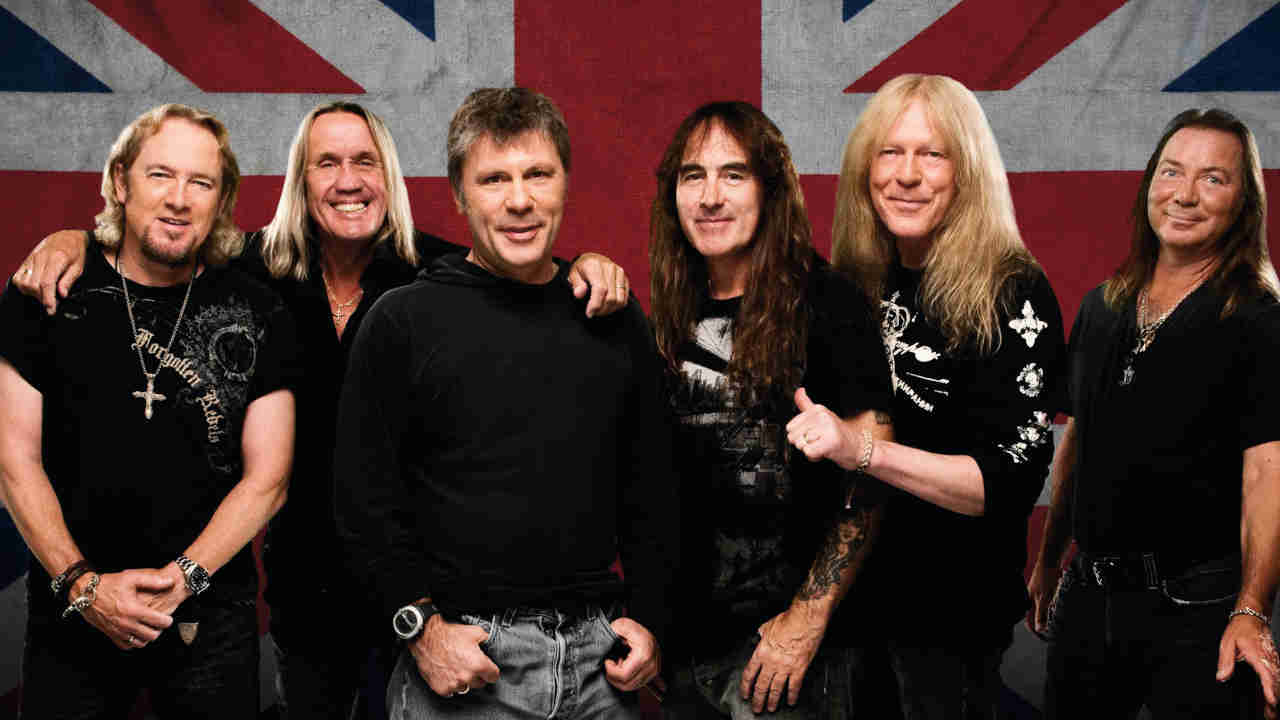
When it comes to success in South America, few bands come close to Iron Maiden. In 2011, Metal Hammer boarded the band’s Bruce Dickinson-piloted Ed Force One plane to witness first-hand the mania that greeted them as they touched down in Argentina and Chili on the tour in support of The Final Frontier album. And what did we discover? Mania on every level…
“Oh, now there’s one! Khanate Of The Golden Horde… now that’ll do nicely for a song title don’t you think?”
Bruce Dickinson is gleefully flipping through the ancient maps included in a 1,384-page tome called Europe: A History, which looks about as heavy as a throne made out of human thigh-bones. We’re currently luxuriating in some very large seats at precisely 30,000 feet aboard Astreus Airlines Flight 666, aka Ed Force One. Just outside the window of seat 1A, a place normally reserved for Bruce but generously offered to Hammer on this occasion, the fearsomely jagged snow- capped peaks of the Andes are just coming into view. Sitting just behind us, scattered among various members of Iron Maiden’s extensive crew, are the collected members of Iron Maiden, and – just to the left of us – manager Rod Smallwood is catching some no doubt well-deserved shuteye.
Just over an hour ago Buenos Aires’ Ministro Pistarini airport was all but shut down as ground crew and staff scrambled to get their picture taken in front of this 757’s impressive livery. Sure, the heavily embellished aircraft may serve a practical purpose, but the lofty triumph that it also represents is impossible to overlook. The words on the fuselage may read ‘Iron Maiden’, but – over 30 years since they first rattled the Ruskin Arms in East London and struck upon a path to glory – they may as well have painted ‘We Win’ on the side.
Last night, nearly 50,000 Argentinian Maiden fans at their country’s National Stadium brought the roof down on the place before a police motorcade whisked the cast and crew back to their hotel following one of one of the most impressive metal spectacles to ever descend on South America’s distinctly European southern tip. Ferocious, sublime, and absolutely spot-fucking-on, the only thing that exceeded Maiden’s laser-guided delivery was the overwhelming passion and religious fervour of their fans. As we hurtle through a blue sky toward Santiago, Chile, this seems like the ideal moment to jot down some initial impressions of the experience for posterity – words like… Holy fucking shit. Oh my fucking god. And indeed, Jesus fucking shitting fucking Christ. A friendly stewardess wheels our a trolley. “Would you like a drink, sir?”
JD and Coke please. Make it a double.
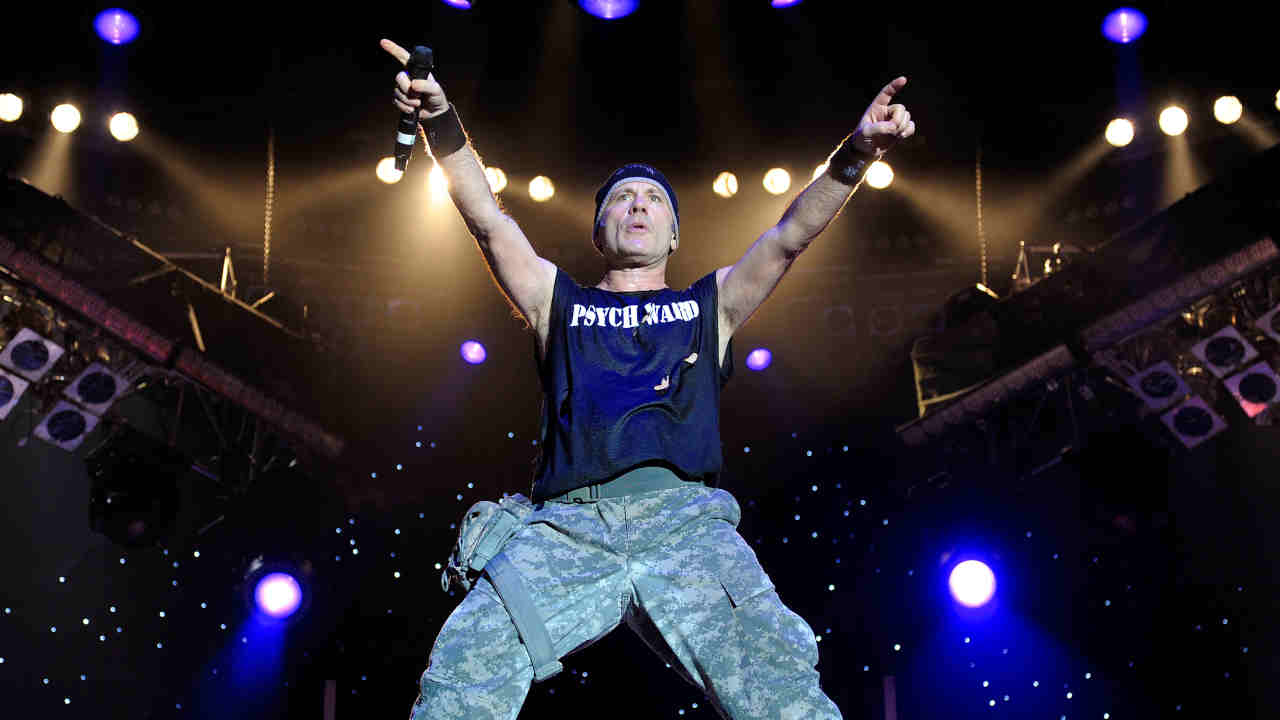
Of course, if you know anything about Iron Maiden’s recent history, then this setting should be no surprise to you. On the back of last August’s The Final Frontier album – the group’s 15th studio release and a progressively minded, conceptually riveting statement of their intentions to barrel ever-forward musically and, it should be said, Metal Hammer’s album of the year – the band have, contrary to widespread panic caused by the title, proceeded with a globe-spanning whirlwind 98-date tour that will see them not only touring the UK, but playing to new legions in virgin territories such as Singapore and Indonesia. In all, they will perform to over two million fans. Read that sentence again. And again.
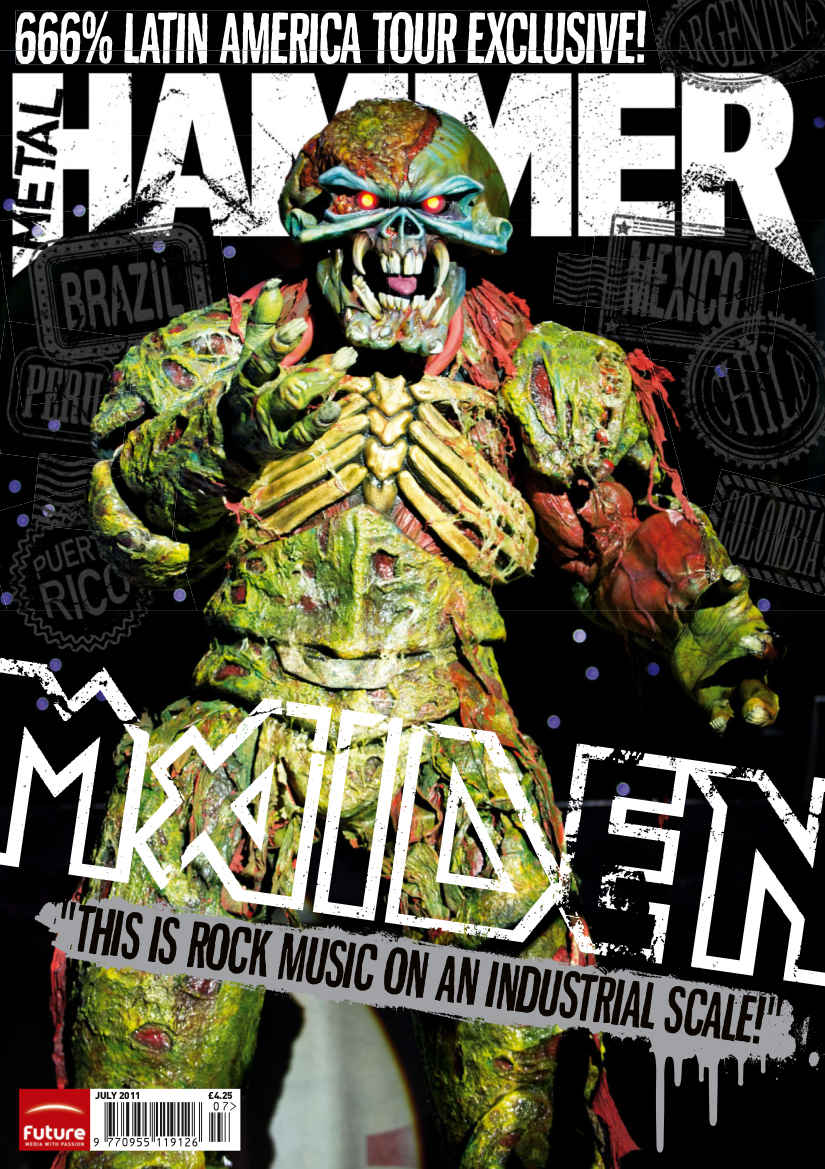
Just a few days ago, that ferocious enthusiasm nearly met with disaster in Rio de Janeiro when a barrier separating tens of thousands of fans from the stage collapsed just minutes into the set, and – acting quickly – the band concluded their set in the interest of safety, but returned the next day to make up for it.
“Yeah, that should never have happened,” says Steve Harris, taking a seat in place of Bruce who’s joined the pilots in the cockpit. “Not to point the accusing finger at anyone but all I can say is that’s not our fault, we tried to do a show and it came down. Thank God no one got hurt. We just got away with it really, and knew there was no way we could carry on.”
As the long-maned founder agrees, it’s that level of ferocity that characterises Latin American crowds, hence the decision to commission Banger Films – the film company responsible for Iron Maiden: Flight 666 – with a two-part live DVD to be shot between Buenos Aires and Santiago for release later this year. Chalk it up to a continent-spanning passion for football, and a team-supporting culture.
“Yeah I think that’s part of it,” he says. “They’re all football fans down here, and they all know the football chants. It’s like everyone’s a supporter of the same side. There’s no rivalry. That’s one of the reasons we wanted to record down there because the fans are so fantastic. It’s always deciding between Buenos Aires, Santiago or Sao Paolo. Sometimes the Argentinians come out on top, other times it’s down to Santiago. I’m just glad there was no upset over the British flag last night,” he adds, referring to the not-forgotten matter of the Falklands war. “Normally when the backdrop comes up during The Trooper you’re not sure how they’ll react, but they were fine and really good about it so that’s good.
As we jog through the various character types he’s identified over the years – the fierceness of the Swedes, the ecstatic roar of India – it swiftly becomes clear that there’s one fanbase currently preoccupying his thoughts more than any other. Just a few weeks ago Japan was hit by one of the most devastating earthquakes ever recorded. A long-standing stronghold of Maiden fans, it’s no surprise that the instant reaction by the band was to donate all proceeds of their Japanese tour-shirts to charity as a result of having to cancel their gig there. The band were en route when the ground began to shake.
“We were nine minutes from landing when it happened, on the approach,” he says, growing solemn. “We were already an hour late and we would’ve been on the ground so maybe somebody upstairs likes us! We’ve always had a soft spot for Japan. We had our first gold disc down there and it’s one of my favourite places to go as a tourist, but in 1980 that was the first time we’d gone that far afield. It was all new to us at the time, and for us to get a number four album in the UK and then hit Europe and then Japan – it was a fantastic year. The first one is always the special one because it’s all new.”
Much has changed since those heady days of yore, and Steve’s schedule reads like any executive’s. Always working, perpetually conferring with Rod Smallwood, he’s the steam in Maiden’s engine, and even now he breaks away to chat with producer Kevin Shirley about the sound mixes from last night’s show. Still the perfectionist, eh?
“Ha! Yeah, people think I’m a control freak but not actually. I’d love to have help but people just don’t know how to do it. We’re very appreciative of what we have, and we’ve worked very hard for it. We never expected it to get like this. In a weird way people are enjoying the shows probably as much now purely because we all know there’s not as much time left. Every gig was sacred in the early days because we were fighting to be where we wanted to be. Now you could argue that we don’t have much to prove, but don’t have as many shows left in us so you have to take as many moments as you can and enjoy them. I must admit that sometimes I have to pinch myself, it’s like Led Zeppelin.”
If the hint of a world without Maiden doesn’t send shivers down your spine, check your pulse. Say it ain’t so, Steve!
“OK, well…” he clears his throat. “I think there will be a next album, and there’s a lot of conjecture – mostly some mischief on the part of Bruce – but I’m up for it and I’m sure everyone else is but we’re so focused on what we’re doing now. I don’t see a reason why we shouldn’t do one in the next year or so. We haven’t really discussed it yet because we’re so intent on what’s happening now. It’s just been left open.”
Well thank fuck for that. Fortunately for Steve, there’s little time to pester him with questions about whether we might expect a nautical theme, as the seatbelt lights come on and we make our approach along the dusty, rugged flight path toward Santiago, where – from the moment we land – an army of fans pressed up against distant fences underscores the need for a swift exit. Fuck The Beatles. Crowds like this are unheard of, and as we’re whisked through customs down a long corridor, hundreds of devotees pound on the windows of a corridor above us, and we’re shown an alternative route should the glass break. Everywhere you walk you can hear chants of, ‘MAY-DEN! MAY-DEN!’ followed by ‘BROOOSE!’, ‘STEEEVE!’ – you get the idea.
With the realisation that the vast majority of airport staff themselves have stopped what they’re doing to take pictures and ask for signatures, the full impact of travelling with one of the world’s biggest bands begins to hit home, because they have shut this joint down. And when this motley entourage is spotted outside boarding a waiting bus, a hundred fans can be sprinting around the airport’s outer perimeter to get close and snap pictures, which makes the fact that the bus can’t leave immediately on account of a broken door all the more unnerving. Fans multiply in the distance and the thought that this could turn into a mob scene edges ever closer to reality. Various mechanics queue up to have a go with the stubborn door as jocularity turns into silent tension. Helpfully, Bruce pulls out a kazoo and begins trumpeting the theme tune to Benny Hill. Surreal? You bet.
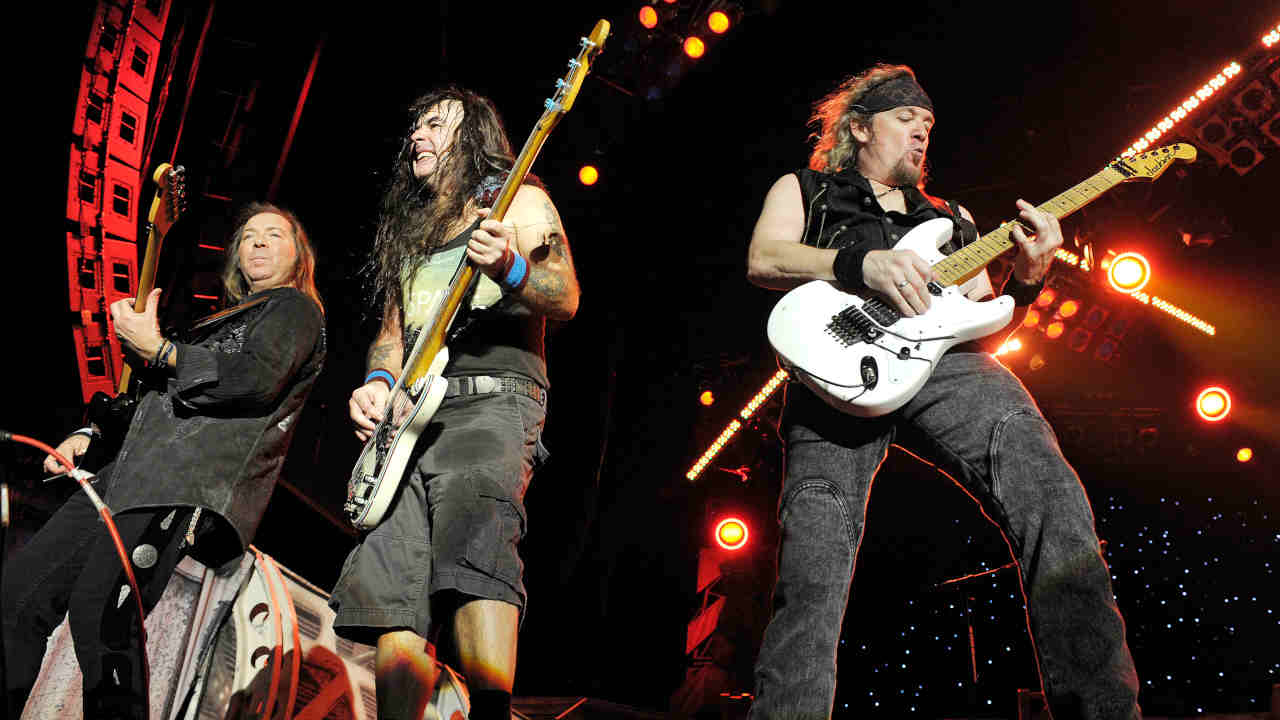
At last, the door closes and we’re whisked to waiting SUVs that proceed to fly through Chile’s barren landscape at warp speed toward downtown Santiago. Strangely, a handful taxis seem to be overtaking us on both sides. Look a little closer, and you can see that inside all the occupants are wearing Maiden shirts and are frenetically snapping pictures and waving. It’s a dangerous game that continues until we arrive at the hotel, where pulling up to the main door is impossible because of a waiting throng. The fervour and enthusiasm is contagious. Despite the gig being over a day away it feels as though it’s already begun.
We pull up to a service entrance and are ushered inside, where a ballroom full of 60 local and national media are waiting with dictaphones and video cameras at the ready. Without time to check in, the band head straight to it to face a barrage of questioning. If you know your detailed Maiden history, then you’ll know that the band’s relationship with this country has been unusual to put it mildly. In 1992, the politically dominant Catholic church banned Iron Maiden from playing here on account of their supposedly Satanic tendencies. The questions, predictably, focus around that incident. A reporter asks: is this like revenge on those people who stopped you from playing before?
“We’re not here to make a point to people who are probably dead,” says Bruce. “Chile is a mature democracy now, and this isn’t about the devil, it’s about music…”
Another question: this isn’t really the final frontier for you, is it?
“Nope. That’s because we’re good,” says Steve, smiling.
“We never relied on the fashionable media,” Bruce adds. “This has always been about support from the ground up.”
It’s been 35 or 36 years since Iron Maiden began, what’s your secret?
Bruce: “Drink heavily.”
And so it goes…
With the press conference in the bag, it’s time to get a few rounds in. As band and crew check in and regroup in the plush hotel’s cavernous bar area, and with fenced-off Maiden fanatics just outside the lobby – it’s a rare opportunity to experience a lull between storms of activity, and a fine selection of Chilean wines. Adrian Smith, Dave Murray, Janick Gers, and then Nicko McBrain, unsurprisingly, seem charmed by the huddled masses outside. Conversation moves to recently departed, erstwhile Thin Lizzy and solo-guitarist Gary Moore, who Adrian has cited as a longtime inspiration.
“Ooh, just now that gave me the chills,” says the softly-spoken six-stringer, straightening his back. “He was very blues-based, the way I am. When we were doing the Killers album in Willesden, he was really nice to us and took us in the studio and was playing with Tommy Alridge doing his 80s band. It was just incredible. He gave me a few tips. I didn’t know him but I felt it when he went because he was an inspiration and a really nice guy.”
As the sun sets the crowd outside begins to grow. As in Buenos Aires, many of these fans will remain outside overnight in hopes of catching a glimpse or snapping a passing bandmember. Quiz the band on it, and you’ll find that – just like flying your own chartered 757 around the globe – you can become accustomed to anything.
“I don’t go out myself,” says Adrian, smiling and settling into his chair. “To be honest I just hang out in the hotel, go to the gym, get some rays – I mean, these crowds are fantastic, but sometimes you just want to come down for a coffee and your hair looks like shit!”
“Oh, not me,” says Janick with a laugh. “Yesterday I just put my hat and glasses on and went out, hit a bar, and walked around. It was a beautiful place. I like to go out and walk amongst the people you’re playing to. They’re just another audience with a different culture, different views about life. If you know who you’re playing to then it makes a difference. We’re very lucky – most people would give their right arm to be playing these places.”
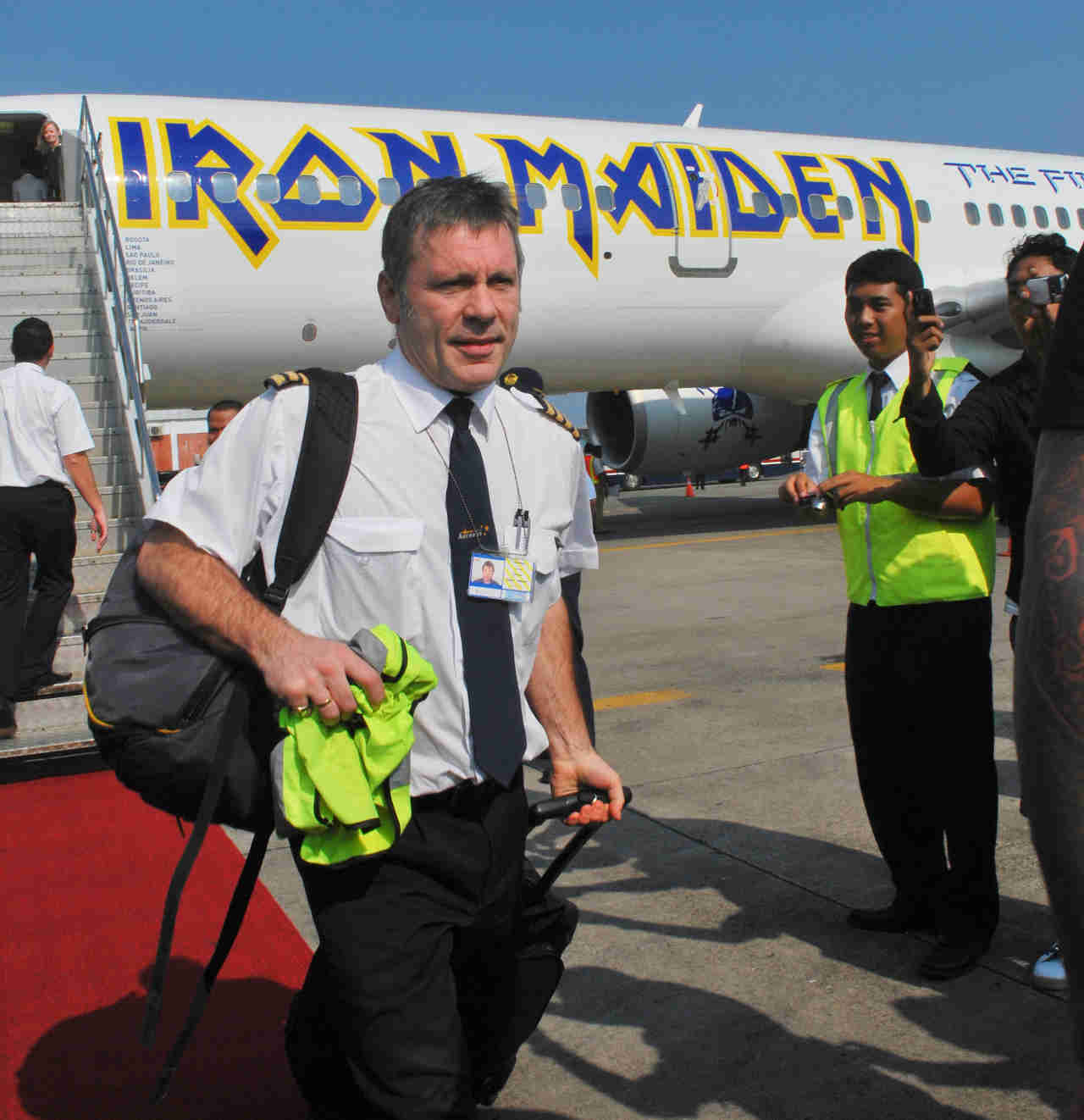
Conversation swiftly moves toward the subject of Maiden’s hotly contested setlist. Unlike 2008’s jukebox-styled Somewhere Back In Time tour, the Final Frontier’s focuses almost exclusively on post-Blaze Maiden, from 2000’s Brave New World onwards. Controversial? Oh yes – but then this is the band that played the entirety of 2005’s A Matter Of Life And Death just a few years ago.
“Yeah, and not many bands would have a go at that,” says Janick. “It makes me proud that we’ll play Where The Wild Wind Blows. You’ve got to take those chances – that’s what it’s about. Rolling Stones fans are as old as the band but we’ve got every generation watching us. I don’t ever look back and say, ‘Oh, remember when…’ It should be right on the fucking edge. Every now and then you slip off, but look – when you start as a musician, the reason why kids are into you is because they love you because of what you did in the beginning. You end up chasing your tail because you’re trying to do that again. You’ve got to take chances…”
“It is truly amazing to see this incredible journey of ebbs and flows of the band,” continues Nicko. “We seem to be getting better, although we all feel like we’re not. It’s harder to do what I do than it was 10 years ago because I’m an old git. You feel like you’re 22 years old but then your body goes, ‘Hello!’ It’s not, ‘What drugs have you got in your pocket, let’s get drunk!’ Now we’re talking about pain medication!”
For all their self-deprecation, Iron Maiden aren’t merely an unstoppable force on the touring front, they’ve achieved something far more significant than reap the rewards of their own success. As the Flight 666 documentary made so resoundingly obvious, the following that Maiden’s music has inspired is one that transcends all boundaries. We all know that they cross every border to play their music, but what’s really interesting is that they’ve generated an appeal among fans who are separated by otherwise vast cultural gulfs. They may speak different languages, but they’re united by an abiding sense of camaraderie, fraternity, and an adoration of heavy fucking metal.
“Anthropologically there’s something interesting about how these cultures all unite around Maiden,” says Dave. “Music builds bridges between different societies and different cultures. It’s like we’re taking our Maiden flag around the planet and it’s such a high.”
It’s at that point that Bruce Dickinson – conspicuously absent as the result of adhering to a rigid workout routine – descends with a bottle of Brazilian schnapps and a local grape brandy known as Pisco. “Get a couple of shot glasses,” he says with a wry smile. “Let’s talk.”
Pisco can make your head spin. It also makes the statement ‘Our hovercraft is full of eels’ funny every time you say it. We’re a robust five shots in, and as hotel guests dwindle upward we cover the subject of hybrid airships – a recent development in aircraft design that aviator Bruce has personally invested in. Also ticked off the agenda: the inherent weirdness of the Basque language, the anti-Argentine Chilean conspiracy during the Falklands war, a universal theory of gravitation, and whatever the fuck rhymes with the word ‘orange.’ Nothing, as it turns out. So far.
“If you don’t want to rhyme with the big boys, stay out of the sausage fritter.”
Good advice. Joking aside, his is an impressive intellect – one rife with fascinations of every subject both academic and political, and it’s easy to digress from the matter at hand. Once anointed with the title of polymath by Intelligent Life magazine, it’s difficult to disagree. And with an afternoon of karting promised for the day after the Santiago show, his energy seems truly boundless.
“Yeah somebody did a number on me by calling me a polymath,” he sighs, taking another sup of the greenish- hued potion. “There are loads of people who are way smarter than me in loads of different areas of their lives but they don’t happen to be in the public eye. I get labelled Steven Fry II but he’s infinitely more a polymath. I dabble in a lot of things. Maybe the singing and airplanes…”
Oh, that.
“Well, to really be doing something extraordinary – that’s rare,” he says, sounding almost coquettish. “We should have been born a hundred years ago when people were still discovering things.”
It’s a peculiar statement coming from the frontman of one of the pioneering bands on the planet – world ambassadors of metal, trailblazers, chart-smashers and heroes to countless young fans around the world who felt their pulse quicken to the exhilarating sound of Maiden’s galloping epics. But then it’s important to remember that Bruce is man who left it all behind following a farewell tour in 1993 only to be replaced by Wolfsbane mainman Blaze Bayley. Given that the songs chosen for this current tour are predominantly extracted from the period following his return in 1999, the story of Maiden’s rocket-like ascent over the last decade is really the story of Bruce’s return following disillusion and rebirth. There’s a deep irony to be having this conversation in the very same environment that Bruce opted to leave behind. If that boggles your mind, read on.
“I’ve grown up with it for 30 years. It’s always been there,” he says, growing emphatic. “I don’t remember not being in Iron Maiden. People go, ‘What a bizarre life you must lead’, but I put it all in a balloon. At the end of the tour it goes pop and I leave it all behind…”
You’re saying you aren’t the man you are onstage.
“No,” he says, the warmth leaving his visage, his stare suggesting the weight and pain of experience. “You can’t do that. You lose the plot. There were times earlier on when you’re sort of fantasising about ‘Wouldn’t it be great to be a rock star?’ You’re 16, you read about guys in magazines, but it’s a complete loss of all sense of reality that goes on. ‘Here’s the keys to the Ferrari, an unlimited supply of drink and shitloads of women.’ From a distance it looks like everybody’s dream, but as much as you believe all these people are consenting adults sleeping and drinking with you because you’re such a great guy, it’s difficult to find anybody that actually thinks about you as an individual. Suddenly you go from being the life and the soul of the party to being the loneliest guy in the most amazing orgy in the world. It’s like, where the fuck do I belong? Believe it or not I saw Barry Manilow being interviewed and he was talking about his asshole years, and I went ‘I’ve been there!’ I knew exactly what he was talking about.”
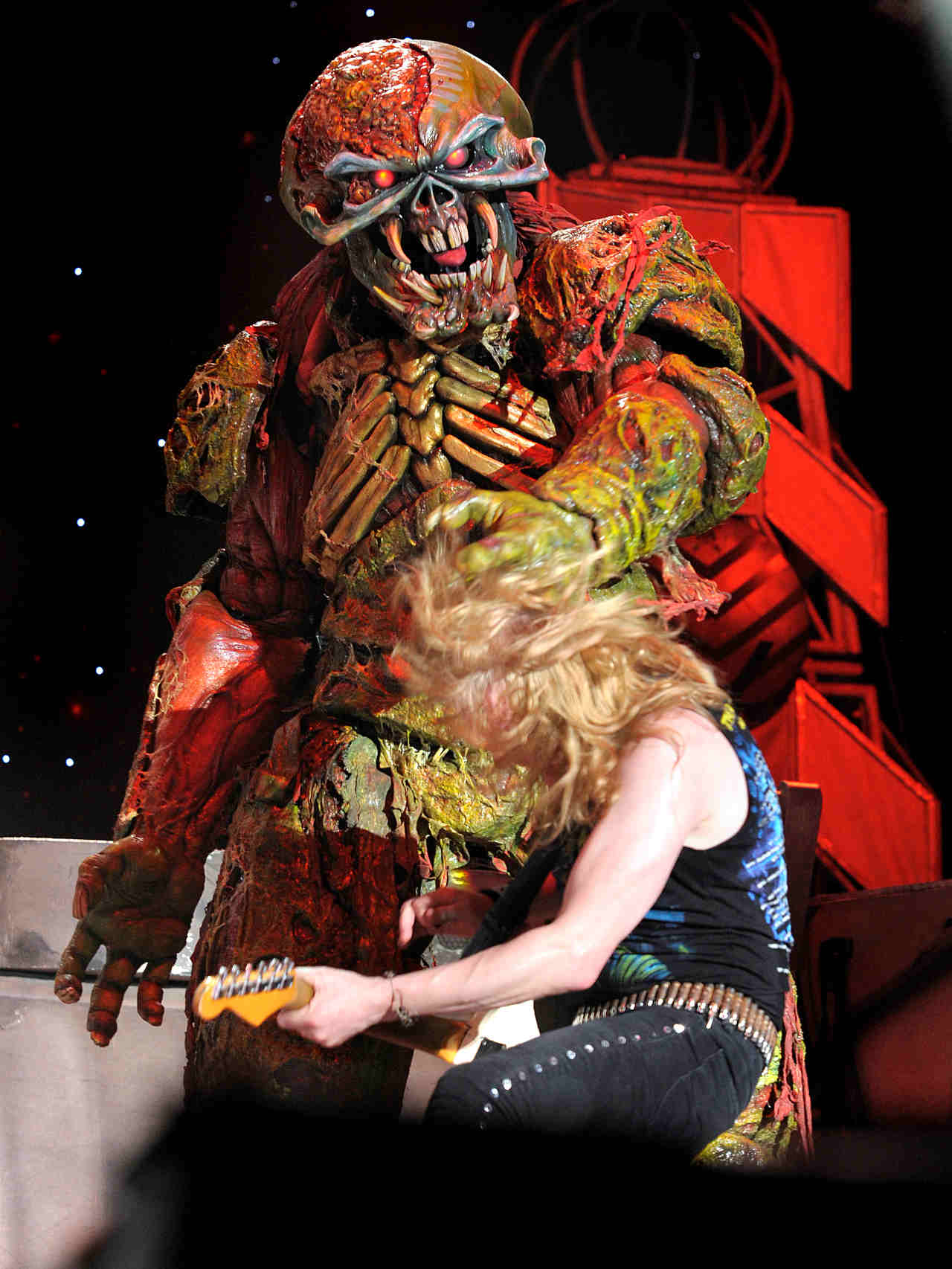
It’s a stunning revelation to have, certainly. When did it dawn on you?
“Number Of The Beast! At the end of that tour I had the most astonishing comedown. In the space of a year I’d left university, been in bands, done pub gigs, never done anything out of the UK, and then I joined Iron Maiden. I’d sit at home and draw PA systems and imaginary bands and here I was as if I’d rubbed a magic lamp. Like a genie came out and said ‘You shall have 50 Marshall cabinets.’ To have all your dreams fulfilled is like having the rug pulled out from under you. It’s like: how can you be such an ungrateful cunt? It was all too soon! It was like: what have I done to deserve this? I remember it so well. I was crawling down a hotel corridor on my hands and knees pissed out of my brains in Tokyo. I’d done a world tour. I’d never even been to Europe before that.”
There’s a line about Alexander The Great weeping when he realised he had no more worlds to conquer…
“Yeah. I remember being there and realising that everything after that was going to be Groundhog Day and I thought, ‘Shit, what do I do about that?’ It was the realisation that the reality of success in rock music is music on an industrial scale. I was under the illusion that I was some kind of artist. The reality is that I’m a hybrid. It’s like, ‘Shit! How will I ever know if they’re the Emperor’s new clothes? Who’s there to tell me that I’m shit?’ That’s why I left, which I think is still difficult for people to understand. I had to find out what else was out there.”
And, in the style of any Victorian explorer of old, find out what’s on the other side he did. He’ll talk about Maiden having hit a plateau, a ‘very satisfactory’ one at that, but the familiarity grated on him. He needed something different. First though, there was the question of who Maiden would choose to replace him.
“Frankly, I was astonished that they chose Blaze. I had a little chat with him at the time, I don’t know how he took it. I said congratulations on the job but you’ve really got your work cut out because you’ve got a completely different voice to me. You need to wipe my memory from the map or else this band will eat you alive. I said good luck, and I really meant that. I think it was impossible for him.”
With the world left scratching their heads and adjusting to a new face of Iron Maiden, Bruce would pursue a number of solo efforts, most significantly his critically annihilated Tattooed Millionaire solo album in 1990 and later, a fully fledged band called Skunkworks.
“Oh, the mail I got. ‘I got the album and burnt it, I stabbed it in the heart!’ It was a good album, we had a great time. Gold records, the hoopla, it doesn’t mean anything when you’re in your box at the end of the day. Creatively, that period really blew the doors off me. I told myself, ‘This is a really safe, comfortable little gig,’ but it just wasn’t me.
“The Skunkworks guys and I had gone through a lot together. We’d played shitholes at the back of buses, right back to how it was before the fancy hotels and everything else. I was singing so much better than I had been for the last two or three years of Maiden. I was like, ‘Actually if I went back to Maiden now it’d probably be quite a shock to what we could do.’ Meanwhile Maiden was sinking without a trace. People were starting to tell me about it. They cancelled a bunch of shows and no one was showing up. And it was like, ‘What the fuck am I going to do?’ You don’t have to be a weatherman to know which way the wind blows. At some point somebody’s going to make the suggestion because artistically I was not on my knees. It wasn’t like they would be picking me up out of the gutter.
“I was reading Henry Miler at the time. He said all growth is an unpremeditated leap in the dark with no idea where you’re going to land. I remember talking to my [solo] bandmate Roy Z about it and I said, ‘I think they might be thinking about going back.’ Roy went, ‘Yeah I know that! We’re never going to fall out about this shit. We’re all big Maiden fans. The world needs Maiden back.’ I was like, ‘Yeah! It does!’”
Bruce rang Rod Smallwood, who’d always remained his manager, and stated his intention to return, but on certain conditions that wouldn’t just alter the fundamental nature of a band already heavily burdened by the weight of of its legacy. It would form the basis of the stratospheric rise of a band already at the stage where most would have been happy to coast on the inertia of former glories. Not so with Maiden.
“I said, ‘Look, I want to come back but I’ll do it on a few conditions. One, Adrian comes back. The other one is that we don’t just do a nostalgia tour, and that we do at least one really serious record together and let’s see what happens’. That was Brave New World, which I think is a classic Maiden record. You’ve just got to have that sense of fearlessness. I got into trouble for saying we’re better than Metallica… and, it’s true! They might be bigger than us and they might sell more tickets than us and they might get more gold-plated middle-class bourgeousie turning up to their shows, but they’re not Maiden.
“I did say it’s a bit of a wind-up. I thought, if I’m going to turn into an asshole I might as well, you know, go for it! Are we going to play to 100,000 people in Chile? Tomorrow we’re going to play to 50,000. How do we get to 100,000? Maybe we can get to 75,000. You can’t push it because that would require such a change in the essential nature of the band. Would you rather play to 100,000 fashionistas or 50,000 proper Maiden fans? Is that big enough for you? It is for me. And there’s no other band that’s done it in the same way.
“The Rolling Stones market themselves as a brand. All of our success since Brave New World has been based squarely on music. We continue to interest people in the records that we make. There’s downloading and the whole music industry has turned on its head, and you don’t make records to make money anymore. You make records to give you the moral authority to make a living out of touring. But for a band to get under the skin of different cultures and religions around the world, now that’s truly revolutionary.”
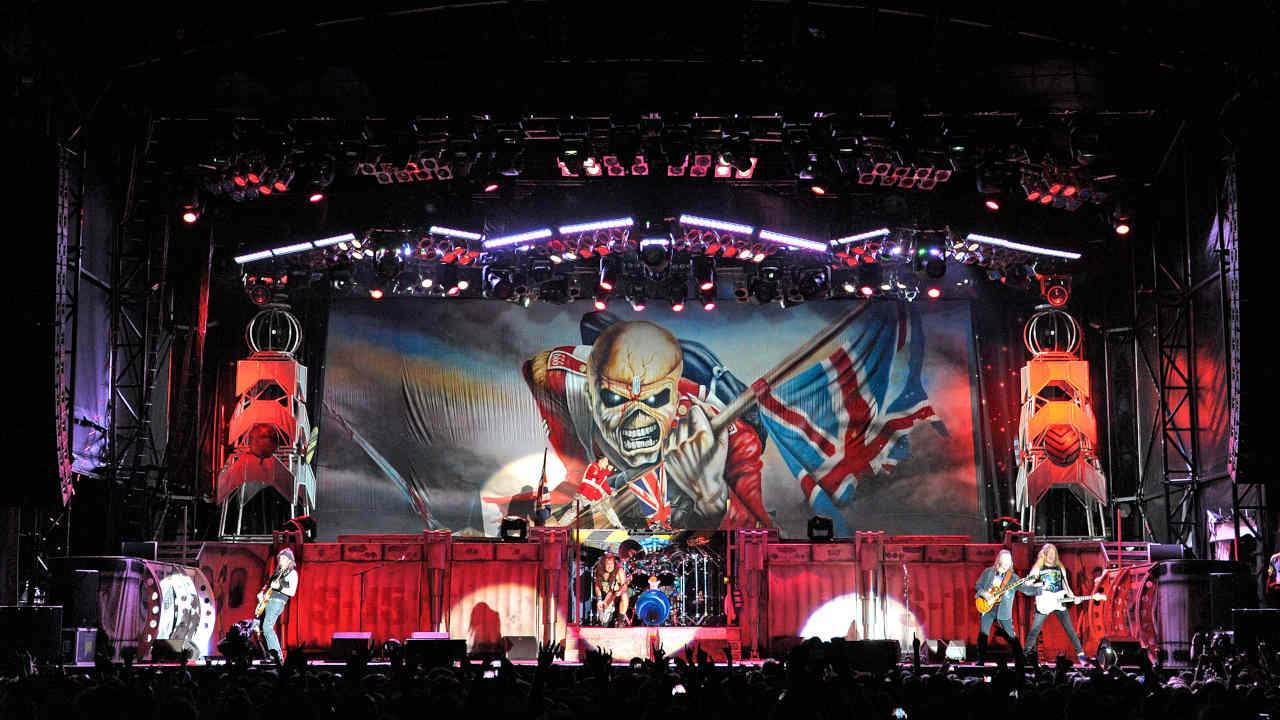
The revolution is being televised. It’s show day, and the crush of fans outside the hotel have multiplied overnight, sporting banners, flags, and in all cases Iron Maiden shirts. What’s striking, though, is that they are all young – these are fanatics born at least a decade after Maiden scored their first hits, and yet their sense of ownership, the feeling of shared identity with the band and fans around the world is a sight to behold.
As Nicko, Janick, Steve, Adrian, Dave, and Bruce descend from their hotel rooms late in the afternoon to be ushered into their waiting motorcade it’s hard not to feel proud that – by association, by being a Maiden fan – the fact that 50,000 people await them and that their Herculean efforts over the years and decades have seen such fruition. “Tickets! Tickets, get your tickets… a hundred dollars,” booms Nicko. “You? You’re Hammer. That’ll be 200 for you then, American dollars only please, thank-you-very-much…”
We arrive at the Estadio Nacional amid a storm of backstage activity – the countdown to showtime is organised by the nanosecond, but despite that the band themselves seem completely at ease with the gargantuan task at hand. Bruce plays pinball in a backstage hospitality area with two pilot friends, Monkey and Patton, who he met in Texas. One of them appears to be air-wanking. A very affable but distracted Rod Smallwood, smoking cigarettes that last just a few seconds is, and, there’s no other word for it, imperiously commanding an army of roadies and crew, 65 at last count, including the production team of Banger Films, and there’s electricity in the air. It only intensifies as Doctor, Doctor by UFO begins to reverberate around the rammed stadium giving way to an epic, sci-fi themed montage that comprises the introduction to Satellite 15… The Final Frontier, the first entry in a set that will see Bruce Dickinson staring down 50,000 Chilean brothers and sisters of every generation, and – listening to the football chants that immediately erupt and reverberate across Santiago’s national stadium, an energy that’s as infectious as it is breathtaking.
“If you look to New Zealand and Japan where they’ve just had an earthquake, to Libya or Egypt – in all those places there are Maiden fans, and if you’re a Maiden fan you’re like fucking family, and you’ve been with us on a long ride.”
It’s hard to disagree with him because tonight feels like a reunion in every sense. Working their way through the legions are over 600 police, many in riot gear, perhaps suggesting that the Chilean perception of those who’ve rammed this stadium to the rafters have yet to change. The police aren’t needed though, because the only mood here is jubilation at a truly flawless set. Bruce is tireless in his delivery, always playing to the back of the room. The epic, progressive refrains of The Talisman sit as comfortably next to The Wicker Man as they do The Trooper and a set-ending Running Free. This is more than triumph. It’s a vision of fearlessness and sheer force of will via the medium of pure fucking heavy metal, and the palpable sense that truly, wherever you are, Iron Maiden’s gonna get you, no matter how far.
Originally published in Metal Hammer issue 219, June 2011







